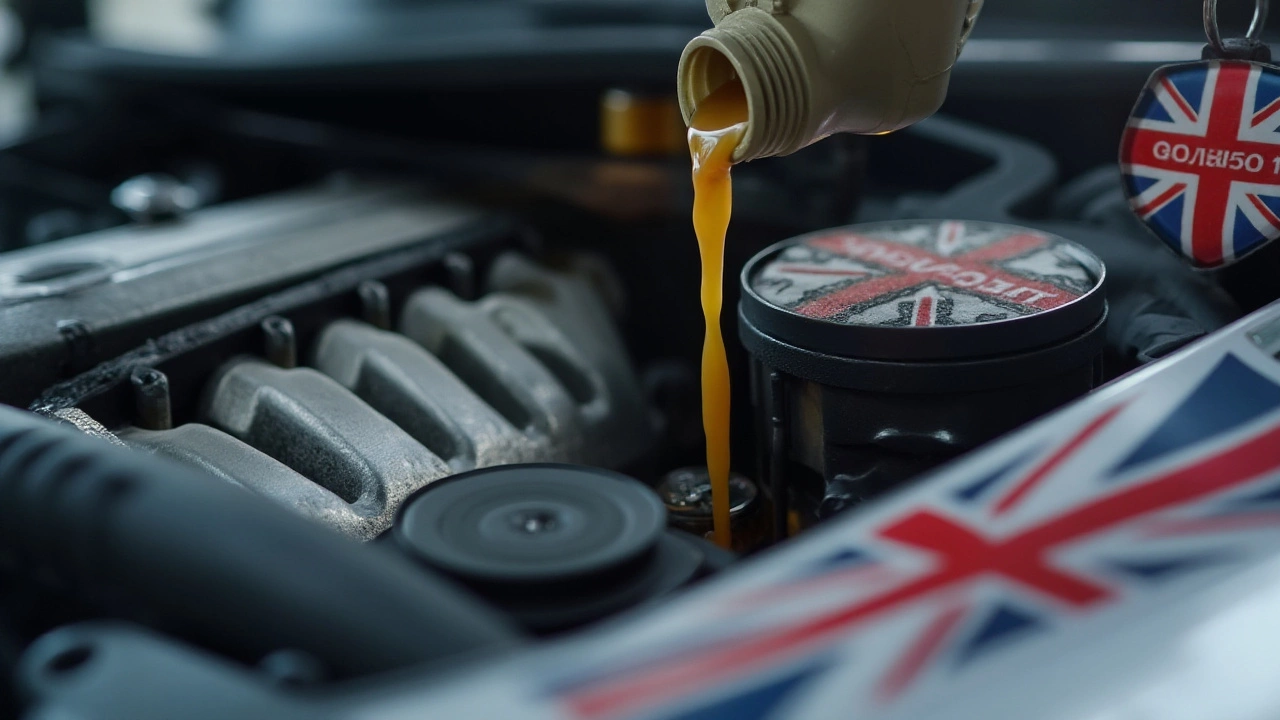In the world of car maintenance, some tasks are simply non-negotiable. Changing your car's oil ranks high on this list. But what happens if you skip this essential duty? The engine oil in your car acts like the lifeblood of the vehicle, ensuring that all moving parts operate smoothly. Letting it age and degrade can spell trouble in more ways than one.
Imagine trying to quench your thirst with a cup of sludge—the picture isn't pretty, and neither is what happens inside your engine when old oil lingers. From reducing wear and tear to impacting fuel efficiency, ignoring oil changes can turn a small oversight into a big problem.
Let’s dive into why keeping your engine's oil fresh is so vital for your car's longevity and performance. Along the way, we'll also share helpful tips on keeping your vehicle running smoothly and identifying tell-tale signs that it's time for an oil change. After all, a little preventive action can go a long way in avoiding costly repairs and unexpected breakdowns.
- Why Oil Changes Are Important
- Signs Your Car Needs an Oil Change
- Potential Consequences of Not Changing Oil
- Tips for Maintaining Healthy Engine Oil
Why Oil Changes Are Important
Your car's engine is a marvel of modern engineering, a complex orchestra of moving parts and mechanical finesse. The conductor of this ensemble? Engine oil. This unassuming liquid plays a multiple vital roles, from lubricating parts to regulating temperature, all while keeping your engine clean. Regular oil change procedures serve as the maintenance that keeps this system humming smoothly without any unwanted upheavals.
Imagine for a moment the chaos in an engine that runs low on fresh engine oil. When the oil can't do its job due to contamination or degradation, friction increases, parts grind against each other, and heat begins to spike. You might be interested to know that according to the Bureau of Transportation Statistics, poorly maintained vehicles, including those with overdue oil changes, can experience up to 35% greater component wear. These parts can become prone to faster breakdowns, and in extreme cases, the entire engine may seize, leading to expensive repairs or even total engine replacement.
It's not just about avoiding catastrophic damage. An overlooked engine oil change can affect your wallet in subtler ways. Engine oil looses viscosity over time, making it less effective at reducing friction between moving parts. This inefficiency transfers to your vehicle's fuel economy, potentially causing you to spend more at the pump. In fact, keeping up with routine oil changes can save you as much as 1-2% on fuel costs annually, according to some estimates. That's a small step for your vehicle but a good leap for your monthly budget over time.
The Protective Barrier
One of the most crucial functions of engine oil is creating a protective layer between engine parts. Both reducing wear and preventing overheating, this barrier is critical for maintaining long-term engine health. As oil accumulates dirt and metal shavings over time, it becomes less effective at maintaining this protective coating, which is why replacing the oil on schedule is a major component of basic car maintenance.
"Regular oil changes are the proverbial apple a day that keeps the doctor, in this case, the mechanic, away," says renowned auto expert Lauren Fix, also known as the Car Coach. This sentiment echoes across automotive forums and workshops because experience consistently marries this preventive maintenance with fewer visits to the service station.
Being proactive about engine oil maintenance does not only extend your vehicle's life but ensures that it runs as efficiently as possible. Every skipped change is a gamble on your car’s lifeline, one that can start an all-too-familiar domino effect caused by neglect. Therefore, it's always wise to consult your vehicle's manual or a trusted mechanic to establish an oil change routine that fits your driving habits and vehicle needs.

Signs Your Car Needs an Oil Change
Recognizing the signs that your car is due for an oil change is a crucial part of being a responsible vehicle owner. One of the first indicators is the dreaded engine oil light that illuminates your dashboard. This small yet mighty light acts as a beacon, signaling that your engine oil level or pressure is critically low. Ignoring this could result in unpleasant surprises later on.
Another classic sign is the color and texture of the oil itself. Fresh engine oil has a golden brown hue and flows smoothly between your fingers. Over time, it turns darker and becomes gritty, revealing its diminishing ability to effectively lubricate and protect the all-important moving parts in your engine. A simple dipstick test can reveal a lot: pull out the dipstick, wipe it clean, then dip it again to check both the level and color of the oil.
An unusual increase in engine noise could also indicate the need for an oil change. When engine oil becomes dirty, it loses its lubricating properties, causing metal parts to grind together noisily. It’s not unusual for an engine to become louder than normal when the oil needs changing. Regular maintenance is key to enjoying a smooth and quiet ride.
You might also notice a burning oil smell. This can occur if oil is leaking onto hot engine parts due to worn-out gaskets. It's a doubly concerning issue because it both reduces oil levels needed to lubricate the engine and poses a risk of creating fumes or even a fire hazard. Any unusual engine smells should be investigated promptly, potentially by a professional.
Lastly, a decline in fuel efficiency should not be overlooked. When the oil in your car gets old and thickens, it forces the engine to work harder than necessary, thereby increasing fuel consumption. Paying attention to your car’s typical gas mileage can save you money and prevent wear down the line.
"Regular oil changes can improve your gas mileage by 1-2% annually" according to the U.S. Department of Energy.Keeping a tab on your vehicle's performance is not just about avoiding repairs; it's a way to actively prolong its lifespan.

Potential Consequences of Not Changing Oil
Skipping regular oil changes might seem innocent at first, perhaps even a way to cut corners on your vehicle's upkeep. However, the reality is that neglecting this routine maintenance can lead down a road of potential automotive disasters. Let’s start with understanding that the primary function of engine oil is to lubricate the engine’s moving parts, reducing friction and, by extension, the heat these parts generate. If the oil isn't fresh and clean, it can lose its effectiveness, leading the components to grind against each other, causing wear and tear.
As your engine's oil ages, it gathers dirt, metal shavings, and other sediments, which results in a thick, sludgy substance. This gunk affects the engine's performance significantly, and fuel efficiency takes a hit as a result. Think about how your car’s fuel efficiency is one of the key aspects that decide how economically your vehicle operates. Old oil can't move through the engine efficiently, leading to increased engine work to maintain the same level of performance, which in turn, increases fuel consumption.
The Risk of Overheating
Dirty oil detracts from its ability to carry heat generated by the engine away from critical components. This lack of heat transfer can cause engines to overheat. The consequences of an overheated engine are costly, including warped or cracked components, complete engine seizing, and more. According to the Automobile Association, "Driving with expired engine oil substantially increases the likelihood of your engine overheating, which can result in significant mechanical failures."Industry experts have long noted that thermal degradation is a significant problem with old, ineffective oil. Mary Jones, an automotive maintenance expert, states, "It's crucial to not only rely on warning lights but to regularly check your oil’s state and quality; overheating usually strikes when you least expect it."
Possible Engine Damage
Engine damage is possibly the most severe consequence when it comes to ignoring regular oil changes. The components in an engine require adequate lubrication to move smoothly against each other. Without it, the repercussions can be catastrophic. You risk facing everything from camshaft damage to complete engine failure, which would mean you’re not just paying for new oil but perhaps a whole new engine. And an engine overhaul isn’t cheap. Skipping on an oil change can transform routine maintenance into a massive financial burden.Reduced Resale Value
Finally, if you plan to sell or trade your car at any point, documentation showing regular maintenance such as oil changes speak volumes. Potential buyers or dealers look for signs of a well-cared-for vehicle, and a lack of consistent oil changes can indicate neglect. A car with a poorly maintained engine due to neglecting oil changes may not only sell for less but could also struggle to sell at all. In today’s second-hand car market, sustainability and maintenance records are more critical than ever.Evading oil changes might save you a little money today, but the small cost of maintenance is minimal compared to the dangers and costs associated with these potential consequences. The choice to maintain your vehicle routinely, keeping the engine oil fresh, is one that ensures your vehicle’s health and longevity for years to come.

Tips for Maintaining Healthy Engine Oil
Maintaining the health of your engine oil is essential for the smooth operation of your vehicle and extends its lifespan. The best way to start is by being aware of your car's unique needs. Every vehicle is different, and so are its oil requirements. Check your vehicle’s owner manual for the recommended oil type and change intervals. These guidelines are established not on a whim but derived from rigorous testing performed under various driving conditions. Sticking to these recommendations is one of the simplest yet most effective practices.
Another critical step is regularly checking your oil levels and quality. Make it a routine to inspect the dipstick, preferably once a month. A handy way to ensure you don’t forget is to do it every first weekend. Insert the dipstick, wipe it clean, dip it again, and see where the oil film stops. If it's below the minimum mark, it's time for a top-up or complete change. While you’re at it, take a closer look at the oil’s color and consistency. Fresh oil is generally an amber color, while dark or gritty oil indicates it’s time for a change. Though this might seem trivial, maintaining the right oil level and checking its quality can prevent severe issues like engine overheating or poorer fuel economy.
Keeping a watchful eye on engine performance is another vital tip. Changes like unusual noises, knocking, or excessive exhaust smoke can be signs of oil-related issues. Upon noticing such changes, don't delay; inspecting or changing the oil could be the preventative care your engine needs. A glowing oil pressure warning light on your dash should never be ignored as it signals immediate attention.
Choosing the Right Oil
Choosing the proper oil can be overwhelming, given the variety available. Synthetic versus conventional, high-mileage versus standard—these choices matter. Synthetic engine oil offers superior performance and protection, recommended for high-performance vehicles or driving in extreme temperatures. In contrast, conventional oil meets basic needs and is often more budget-friendly. Consider factors like your vehicle's age, climate conditions, and even your driving habits when making this decision. A fair balance helps in maintaining a healthy engine, ensuring oil does its job effectively.
"Using the right oil and changing it on schedule is key to keeping your car running smoothly and avoiding long-term damage," says an expert mechanic from the National Institute for Automotive Service Excellence.
Also, regular tune-ups significantly enhance engine oil performance. Replace the oil filter with every change; old filters can no longer effectively trap contaminants, risking circulation back into the engine. Investing in routine maintenance checks, such as tuning up spark plugs, air filters, and checking fluid levels keep the engine’s capacity to function to the fullest. This means the oil can maintain its quality as it’s not working overtime to compensate for neglected parts.
Seasonal and Driving Habit Adjustments
Adjust oil change intervals according to your driving habits and seasonal changes. Long commutes or frequent short trips can degrade oil faster than expected. Similarly, harsh winter conditions can thicken oil, delaying circulation in the engine. It may be beneficial to switch to an oil with the appropriate viscosity rating in icy climates. On the opposite end, sweltering summer heat adds strain as heat stresses engine components, burning through oil quicker. Keeping these conditions in mind when deciding on oil change intervals ensures your engine oil is always performing at its best, keeping you on the go without worry.






